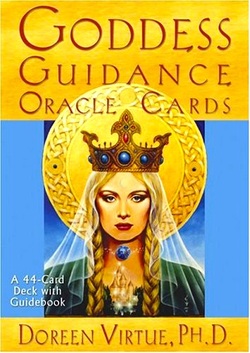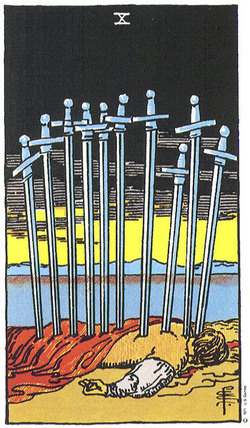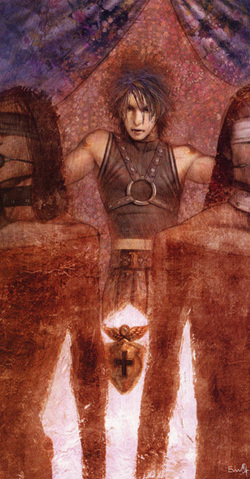 Well, we're at the end of the Ultimate Blog Challenge, and I've successfully written 31 different posts relating to Tarot, history, fear, motivation, diversity, creativity, and my continued ridiculous love for Leonie Dawson. This is a huge thing for me, because while I love my blog to pieces, and I love everyone I've met through it, sometimes I slip up. I don't write a post every day, so I write extra posts and backdate a day or two. I don't always promote every post perfectly. Some of my ideas have been great, some not so great. I could write for a month or ten years, love it no less, and still have it be a learning process. So accomplishing this, having everything to show for this month, is a big deal for me. Why would I tell you this when I'm a life coach? When I use my gifts as a Tarot reader, along with creative exercises and a guiding hand, to help others to learn, plan, expand, and grow? Because it's okay.I have ADD, Attention Deficit Disorder. That means things like schedules, repeated tasks, and details are sometimes difficult for me. I've had to learn, over a long period of time, that Getting Stuff Done and Being Organized doesn't come as easily to me as it does to other people. That means I've done more to learn how to make it happen for me, what works and doesn't work, what fits into my personal rhythm and needs. And that means I've learned how to make mistakes: with acceptance. Understanding what happened, and how that's where I'm at. Resolving to take what I've learned, and try again tomorrow. I've had times in the past where I'd decide that overnight, I was going to be a master of everything. I'd plan to work my tail off until my house was sparkling, my eating habits were flawless, I'd accomplished four or five different projects and still have time to read a book about spirituality or self-development at the end of the day. That just doesn't work. Even when I finished most of what I planned to do, I was exhausted. The things I loved felt like chores, items on the checklist of life rather than something that could genuinely benefit me and be enjoyable. And the stuff that wasn't so great? I'd punish myself over it - until I learned that not only was this biologically supposed to be difficult, but learning it was a process. So I set a few things to do each day. I broke it down and made it simple for myself. I slowly chipped away, and I kept moving forward. No punishment, no judgement. If I had an unproductive day, I'd look at what happened, and I told myself I'd do better tomorrow. And when I got the website made, the class finished, the story written, I'd be able to look at it and say: "I did that."Congratulations to everyone else who completed the Ultimate Blog Challenge, and to anyone worrying about what they haven't accomplished: nothing is impossible. The only way you could ever lose your way is to stop moving completely.
 I have a confession to make, and it's one I've been putting off for a long time.
I've been experimenting...
With oracle cards.
The Doreen Virtue Goddess Guidance cards, to be specific, with the sparkly gold edges the pretty, soothing pictures of gorgeous women. The sweet, "non-threatening" messages.
And okay, okay, I jest. There is nothing wrong with oracle cards - they're lovely! And fascinating! There's so much variety! But I was always a bit skeptical about Ms. Virtue. Not because she's doing it wrong - no one is doing it wrong. But I didn't know if she was for me.
I don't know if I believe in Indigo children, you see. Angels and faeries do incredible things for some people, magickally and spiritually - I've met just as many people who say these are powerful forces you don't want to mess with idly. (I've got no idea how they got such a different set of references.) And then there's Doreen Virtue's Tarot deck, in which she claimed she'd removed anything "threatening" or "scary" - when really, the only thing scary about Tarot is how it might tell you there's things in your life that need a little work. Why would I want to avoid anything that might tell me the truth?
But I kept running into these cards, over and over again. Different readers would pull them to supplement a reading. They were out for display at my favorite occult shop, and I couldn't stop staring at them. And finally, a financial windfall came my way to treat myself to some Amazon goodies, and I put them on the order list.
What strikes me first about these cards is the artwork. It's so lush and also so varied, in different styles and forms of expression that let you really feel the personality of each goddess as the cards express them. You could use these cards meditatively if you like, delving into the details of each image and seeing what stands out to you. Or you could just treat the goddess in each card as a friend and a guide, as the deck encourages you to do. That'd trouble you, obviously, if you come from a faith that views these figures as literal beings who want to be called on and honored in a specific way, but as I'm more from the "facets of the same diamond" camp, I see the cards as having a unique energy that they bring with each individual message.
In general, oracle cards tend to be more specific than Tarot, more on point. That doesn't allow for a reading of more than a few cards, and it doesn't delve into complexity, but it provides an excellent springboard for deeper work. Reflecting on the energy of a single card can provide a lot of journal fodder, or maybe researching the nature of that goddess beyond the surface, learning the deeper aspects of her particular message. (I do wish the guidebook provided a little more insight into each individual goddess, and the legends that informed her message.)
There really is a lot of variety for "gentle, non-threatening" messages. Ishtar encourages you to set healthy boundaries, and Green Tara tells you that this may be a time to avoid harsh situations or environments. Kwan Yin tells you to be compassionate towards others, but most of all towards yourself. I realized very quickly that giving yourself kind, careful messages doesn't always mean avoiding truths. Certainly a few daily draws have already given me a lot of food for thought. But much like Tarot, it's up to me how deep I choose to go, whether I do the reflective work on what a particular card might mean to me. That provides a bit of extra responsibility on the part of the seeker, but I can't think of anything less coddling than that.
While Tarot's definitely my one true love as far as divination's concerned, I think I can count this experiment a success.
 Have you ever encountered something that just makes your eye start twitching and your fingers start drumming? The kind of thing where no matter how much you try to practice non-judgmental bliss, it can sometimes just get to you? Here are a few things I've seen in Tarot that get under my skin.
1. "Gypsy" fortune teller acts. First of all, "Gypsy" is actually a really insensitive word. A lot of people don't know this, so don't feel horrible if you used it up to now or anything. But it's a big-time slur in Europe, and it isn't even accurate, considering it was used to refer to the Romani people because they "looked Egyptian" and no one could be bothered to ask them for the facts. Kind of like "Indians" referring to Native peoples in North America.
The actual semantics aside, if you're reading Tarot more for the entertainment than the counseling angle - and that is totally fine, seriously, as long as you make it clear that's what it is - then you can probably find a sparkly costume to do it in without an accent and the words "cross my palm with silver." Come on, guys. There are like six stereotypes that plays on, and not enough people know what they really refer to.
2. "Bad" cards. People who are reading for themselves tend to do this. A reversal is "bad". The high Swords cards or the Tower are "scary". The Star in the "what to watch out for" position means "you are heretofore advised to throw yourself into a pit of despair and never be optimistic again."
You can read everything super-literally if you want, and I get it if you want the cards to just serve up a slice of truth: "No, the job probably isn't on the way. And also you should probably look out for the bolt of lightning that's going to shake your world up. Just warning you." But I feel like I'm watching a mime box himself in. The problem isn't how you're reading, when you do it this way, it's how you're responding to what it says. I honestly can't, in my heart of hearts, believe your inner guidance and a hand from the Universe is simply saying "Your life will suck right now."
Why is there going to be a bolt from the blue, or a feeling of total despair? You're never helpless in your life, and rarely does anything just happen to you, so determine what's going to show up in your world and decide how you want to feel about that. Adjust circumstances accordingly. Maybe you're not supposed to get the job because there's a better one on the way. Or the sudden, painful revelation will lead to you reinventing your world in a way you'd never have been able to before. Tarot is never just about things happening to you. It's about looking at the road you're on, where it's leading, and if you want to change direction.
3. "They're doing it wrong!" Yes, before you ask, I see the irony here. But seriously, I can't stress this enough. Yes, there are close-minded ways of catering your reading to exactly what you want to hear, or responding to your reading from a place of fear. And that's not good for your learning, or what you get out of reading Tarot. But I'm talking about the methods you pick up and the teachers you choose. There is no end-all-and-be-all as far as that's concerned. The only way you could possibly be "doing it wrong" is if you learn one way, stop there, and refuse to learn anything else. The more information you gather, the more you can decide for yourself what's worth doing and how.
But, here's the real reason for this one: even if you work for years and decide the best way to learn or teach or read the cards or whatever else, please don't be a jerk about it. I have seen a few Tarot experts and instructors call each other out, often by name. I've seen them get judge-y for having a different opinion, teachinga certain way, charging a certain amount of money. I can't think of anything that turned me off faster than watching a seminar from an instructor, and listening to them smugly outline how their teaching was superior to someone else's book.
Everyone learns differently. Everyone responds to the cards differently. Don't limit yourself by stereotypes, by fear, or by inaction. But most of all, don't ever limit someone else by telling them there's only one way to tap into the cards. Tarot is far too elaborate, magical, and full of potential for that.
 "Absolute power corrupts absolutely."
"The power of man has grown in every sphere, except over himself."
"If you want to test the mettle of a man, give him power."
When you're trying to grow anything of your own - confidence, creativity, self-love or self-discipline - power eventually comes up. What has power over you? What do you have power over, and what should you be able to control?
We're taught, probably for a good reason, to be afraid of having too much power over the world around us. After all, will we really know how to use it wisely? Will we wind up becoming one more person in a long line of bullies, acting only in our self-interests? Or are there institutions that have had power over us for too long, and is this the only way to make a stand?
The Tarot has a lot of cards about power, and in writing my upcoming course, I was surprised at how much crossover there was in just the first six. There's the Magician, who is a magical student, adept, or a stage magician and a shyster depending on who you ask. There's the Emperor, a ruler of men, and the Heirophant, a ruler of our traditions and institutions.
That's to say nothing of the cards that come later, such as the Chariot and Strength, who in many decks come right after each other. To me that's the story of "hard control" vs "soft control", of the times you have to take life by the reins and steer, the times you have to gently tame your inner beasts and demons. It's the Chariot I decided to put up as an illustration for just that reason. And wouldn't you know, my randomizer selected the Lunatic Tarot by Evan Yi Feng. It's one of the first decks I've ever seen where the charioteer isn't pulling horses, or a dark and light Sphinx, but instead is in command of human beings. That's scary - but the beauty of it is when you take a look at that illustration, if it's drawn in your reading, and say "am I exercising control or abuse of a situation?"
There are so many ways to use power, so many ways to define what it even is or where it belongs. That's why to me, power itself isn't a dirty word. We're afraid to call ourselves powerful, to say we have any kind of control. We think it'll make us scary, selfish, or egotistical. But if you don't have power over anything, ultimately it has power over you. You lose any kind of hold you might have over your own life, or the life you want to make for yourself.
"With great power comes great responsibility." And if you don't acknowledge your potential for power, you don't take responsibility for what's happening around you. The beauty of the Major Arcana is that we've been all its figures at one point, or will be someday. We've taken charge or been stuck in tradition, we've fought our problems with gentle grace or by reigning them in. If you don't like the role you see yourself playing, you can understand the part it's playing in your life, and make the choice to transform into another.
And that's the ultimate power over, and responsibility for, your own life. So who will you decide to be today?
|




 RSS Feed
RSS Feed

